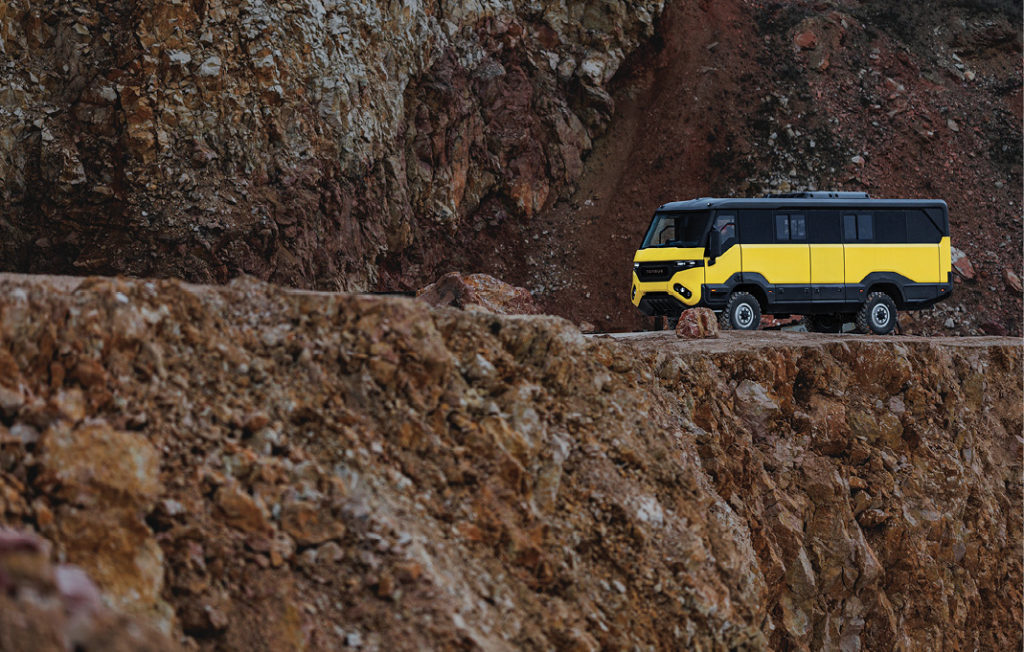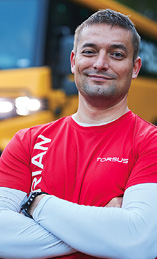Transportation where no roads are supposed to be

Q & A with Vakhtang Dzhukashvili, co-owner and CEO of Torsus
Torsus produces the “world’s toughest heavy-duty off-road buses.” Founded in 2017, the company has a headquarters in the Czech Republic and a factory in Slovakia. Its first offering was the 37-seat Praetorian coach. Described as the world’s toughest heavy-duty off-road 4 x 4 bus, it can travel even further and harder through the most inhospitable terrain. From comfort to safety, Torsus Praetorian can tackle any weather condition anywhere, anytime.
A second model is the nine-seat Terrastorm minibus. There is also a new fully electric vehicle under development. Another model, Praetorian Minesite, has been created as a standard transporter for safe and comfortable carriage of a group of workers to their mine working location, usually out of public roads.

CMJ spoke to Vakhtang Dzhukashvili, co-owner and CEO of Torsus, about the company’s history, present, and future.
CMJ: As a conversation starter, can you please talk to us briefly about the history of Torsus, the vision, and why did you decide to start that kind of a business?
VD: I am proud to lead Torsus, a company dedicated to pioneering the design, development, and manufacture of the world’s toughest off-road buses. Together with my wife, Yuliya, we established the company in 2016, with me serving as CEO and her as chief strategy officer. At the heart of our product line-up are two central offerings: the Praetorian and the Terrastorm.
Torsus serves a diverse range of customers in heavy industry, utility, and government service sectors across global markets. Through strategic partnerships with MAN and VW, we leverage key chassis, skeleton, and powertrain technology to ensure that every Torsus bus embodies ultimate durability, reliability, serviceability, comfort, and safety. Above all, toughness is engineered in.
CMJ: Torsus describes its products as the “world’s toughest heavy-duty off-road buses;” can you please give us a brief tour of the current lineup? What are the industries where Torsus products could be in demand?
VD: At Torsus, we specialize in manufacturing off-road heavy-duty buses. Our flagship model, the Praetorian, boasts top-of-the-line suspension and drivetrain systems, enabling it to tackle the most challenging terrains over long distances, and handle heavy loads with ease. Equipped with advanced technologies like differential lockers, this bus is well-engineered to access even the most remote locations, especially in the hands of skilled drivers.
Additionally, we offer the Terrastorm, based on the VW Crafter and MAN TGE platform, in a smaller form factor. This heavy-duty off-road vehicle undergoes extensive modifications to enhance its suspension, interior, and drivetrain capabilities, ensuring exceptional performance in demanding environments.
Our buses find applications across various industries, particularly in mining for transporting personnel and cargo across rugged terrain, including coal, gold, and iron mining sites. They are also utilized in tourism, providing transportation in mountainous regions and ski resorts, with some even ferrying passengers up the Mount Etna volcano. Adventure tourism is another significant area of use, where our buses enable exploration into remote natural landscapes.
In emergency relief efforts, our vehicles play a crucial role in evacuating vulnerable populations and serving as all-terrain ambulances. Notably, we are witnessing growth in the farming sector, where our buses are increasingly utilized for various agricultural purposes.
CMJ: What are the advantages of using the Praetorian Minesite model in the mining industry?
VD: We conduct industry sector research studies in our unique way, blending sales and marketing. Our sales team does not just push products; they listen to what customers want to achieve and how they want to achieve it. They bring these insights back to our team, asking, “Can we do this?” This communication style was particularly evident in our interactions with mining clients.
Personally, I spent a lot of time discussing their standard processes, identifying their needs and challenges, and figuring out where we could enhance our products. Having our design, R & D, and engineering team in-house allows us to quickly adapt products to meet specific requirements. For instance, if a customer in Chile needs a durable floor, we ensure that our product meets that need, understanding that the same requirement might apply in Australia, so we fit a durable aluminium floor, which is not standard in the bus industry. We capture this knowledge in our product development, offering well-thought-out options to the market.
Adapting to cold conditions, like those in Canada, is a topic I am passionate about. When we initially focused on delivering vehicles to hot countries like the U.A.E., discussions often centred around air conditioning. However, I realized that insulation is just as crucial. Our multi-layer, multi-component insulation reflects heat back into the car, benefiting both hot and cold climates. Testing our vehicles in extreme conditions, from –35°C to 50°C, revealed the importance of cooling down the interior to a standard 23°C, regardless of external factors. This certification requirement ensures comfort and safety for passengers.
CMJ: How has your company changed with the Covid-19 pandemic, and then with the conflict in Ukraine? What changes have you made to adjust?
VD: The impact of Covid-19 on our production and supply chain has been significant, with even the smallest parts causing disruptions. Motivating employees to return to the office post-Covid-19 proved challenging, prompting us to explore various strategies to make office work more appealing.
However, amidst these challenges, Covid-19 has also been a catalyst for positive change. We have enhanced the resilience of our supply chain by bringing more parts production in-house. Additionally, we now operate with a multinational team spread across different countries, which has proven to be more efficient than our pre-Covid-19 setup. The implementation of vaccination and sanitization measures has resulted in fewer illnesses among our team during the winter months.
Despite the ongoing war in Ukraine, we remain committed to our Terrastorm R&D centre in the country. Rather than withdrawing operations, we have chosen to invest further and support both our employees and the local community. Initially, the uncertainty of the war posed challenges, but we have since stabilized our operations and adapted to a new normal. We have taken steps to ensure the safety of our employees, providing medical supplies and establishing secure living and working environments. Furthermore, we have contributed to humanitarian efforts by supplying emergency vehicles and aiding in the distribution of relief supplies throughout the country.
CMJ: Are you looking at developing autonomous vehicles and BEVs as part of your strategy?
VD: My team are considering electrification for our vehicles, but it is worth noting that our customer use cases rarely involve electric vehicles. While we plan to eventually convert our smaller Terrastorm bus to electric power, this will not happen in the immediate future. As for the Praetorian, we are currently in the investigative phase. Our approach begins with thorough discussions with customers to gain a deep understanding of their needs. From there, we prioritize robust engineering, aiming to deliver a high-quality product. Regarding self-driving technology, I must admit, I have some reservations. While we are exploring the possibilities, the idea of a bus with 36 passengers but no driver makes me apprehensive.
CMJ: In your opinion, how does the future look for Torsus?
VD: My strategy revolves around maintaining technical superiority in our products. My team and I are committed to constantly enhancing our vehicles, ensuring that we remain at the forefront of the market while setting ourselves apart from competitors. Moreover, we are placing renewed emphasis on bolstering our aftersales service to provide comprehensive support to our customers worldwide. Although we have already expanded our sales to all continents, notably absent are vehicles in Canada and the U.S. However, it is a significant part of our plan to establish a presence there. Understanding that certification processes differ in North America compared to Europe, we are actively seeking partnerships to exchange technological insights and assist us in achieving the necessary certifications for the region.
CMJ: Finally, what advice would you give to future founders to help them market their products to the mining industry?
VD: My advice is to prioritize listening to our customers’ needs. By creating a wish list based on their feedback, we can focus on addressing exactly what they require. This approach has been the key to our success story. We consistently engage in discussions with our customers, listening to their input and brainstorming future innovations together. This collaborative process allows us to provide them with a refined product that meets their needs precisely.
Comments